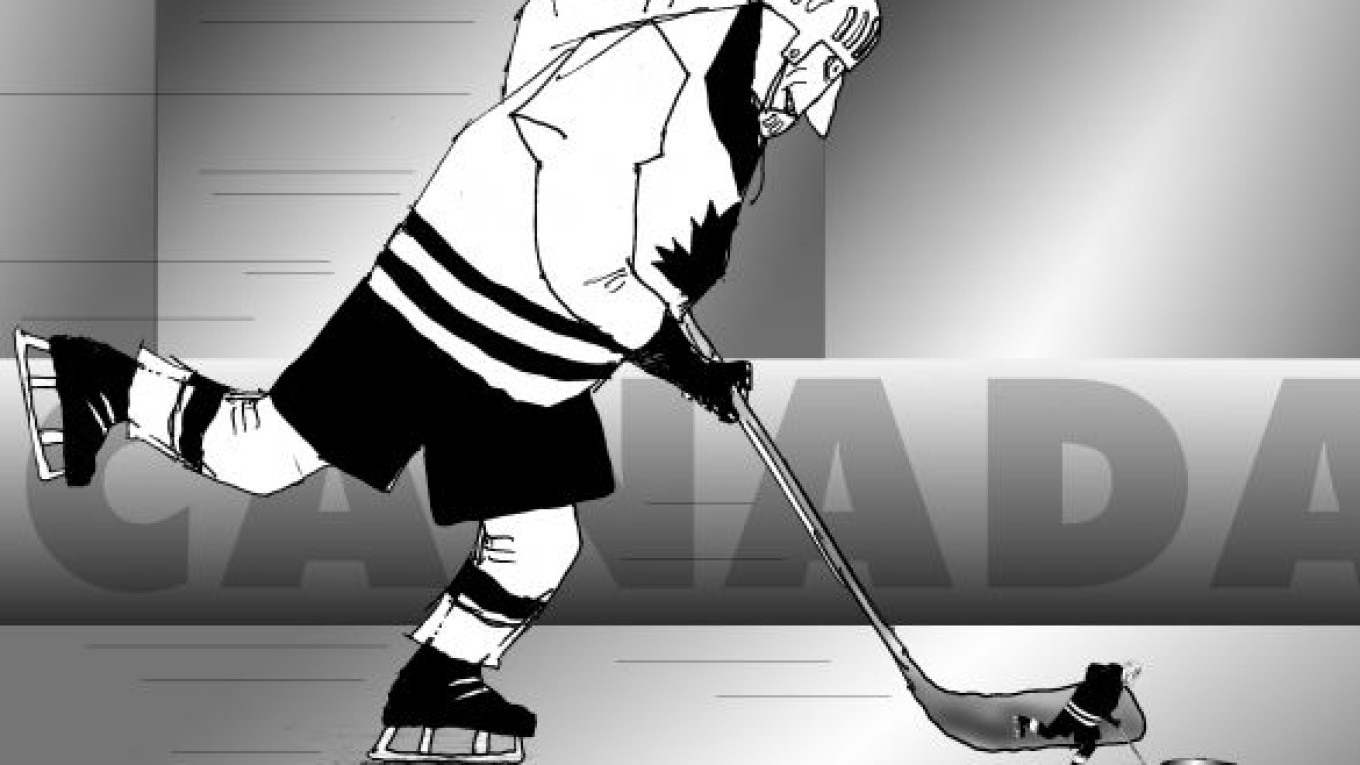Phew! Thank heavens for that.
The Vancouver Olympics can go on because Canada beat Russia at ice hockey. Humbled is a better word. Which is good, because things would have become pretty miserable at the Winter Games otherwise.
Canadians are just too polite to chuck visitors out, turn off the lights and declare, “The party is over.” They probably would have kept the Olympic flame burning for a few more days out of courtesy. But their hearts no longer would have been in it.
To understand how big this match was for Canadians, consider that they view a Sept. 28, 1972, victory over the Soviet Union as their Neil Armstrong-lands-on-moon moment. Practically everyone old enough to hold a hockey stick that day — and they start them young in Canada — remembers where they were when Canada’s left-winger Paul Henderson scored the winner with 34 seconds left.
It was the puck that gave communism a black eye. As a friend told Henderson when the Berlin Wall came down 17 years later, “That goal you scored was the last nail in the coffin. They never recovered.”
The Cold War, of course, is old history now. But on the hockey ice, it never really ended. “Da, da, Canada. Nyet, nyet, Soviet” read placards waved by fans in Canada Hockey Place on Wednesday — the same chant shouted by the 2,700 Canadian die-hards who made the trip to Moscow in 1972.
Stripped of the geopolitics, this Olympic quarterfinal was never going to outshine that once-in-a-lifetime memory. But it was still everything that Canadians — all 34 million of them, give or take a baby or two — had hoped for, and more.
The first 20 minutes were the most intense sporting experience you’ll see at a venue anywhere. If you felt the earth wobble on its axis sometime Wednesday or early Thursday, depending on your time zone, that was millions of people across Canada leaping up and down when Ryan Getzlaf scored the opening goal.
The crowd of 17,740 packed to the rafters in Hockey Place shouted “Go, Canada! Go!” so loud that the building literally shook. A freaked-out mouse, utterly disoriented by the earsplitting din, scurried out of his hiding place under the first rows of seats, in search of somewhere quieter. Everyone in the building is a little harder of hearing now.
When Shea Weber made the score to 6-1 with less than half the game played, a blonde woman in row eight and a wooly hat emblazoned “Canada” in bright red letters mouthed, “How is this possible?”
Russian coach Slava Bykov was probably asking himself the same thing. What a poker face. The final score was 7-3. The Canadians just wanted it so badly.
“They keep coming, keep coming,” said Yevgeny Nabokov, whose terrible goaltending cleared the route for Canada’s rout. “We were not able to stop the bleeding, and they played a hell of a game.”
Canada already has a bunch of golds — not as many as it hoped for from its home-soil Olympics, perhaps, but still a tidy trove. But it’s gold in hockey, the game they invented and which Canadians covet most because this is more than just a game for them, it’s an expression of their soul.
“Hockey helps us express what we feel about Canada, and ourselves,” reads “Home Game,” an authoritative look at the sport by former NHL goalie Ken Dryden and author-journalist Roy MacGregor. “It is a great point of contact, in a place, in a time, where we need every one we have: east and west, French and English, young and old, past and present. The winter and the land, the sound of children’s voices, a frozen river and a game all are part of our collective imaginations. Hockey makes Canada feel more Canadian.”
The final is Sunday, just before the Olympic closing ceremony so that these sometimes-troubled Winter Games can finish on a high note. To set up that storybook ending, Canada must beat Slovakia in the semis.
Until then, Canadians can savor the satisfaction of having silenced Russia’s biggest star, Alex Ovechkin. “We have probably the best country in the world,” he said before this match. “Everything is the best: hockey players, cars, girls.”
The last two, who knows? But as Canadians will tell you, it’s having the best hockey players that really counts.
John Leicester is an international sports columnist for The Associated Press.
A Message from The Moscow Times:
Dear readers,
We are facing unprecedented challenges. Russia's Prosecutor General's Office has designated The Moscow Times as an "undesirable" organization, criminalizing our work and putting our staff at risk of prosecution. This follows our earlier unjust labeling as a "foreign agent."
These actions are direct attempts to silence independent journalism in Russia. The authorities claim our work "discredits the decisions of the Russian leadership." We see things differently: we strive to provide accurate, unbiased reporting on Russia.
We, the journalists of The Moscow Times, refuse to be silenced. But to continue our work, we need your help.
Your support, no matter how small, makes a world of difference. If you can, please support us monthly starting from just $2. It's quick to set up, and every contribution makes a significant impact.
By supporting The Moscow Times, you're defending open, independent journalism in the face of repression. Thank you for standing with us.
Remind me later.


